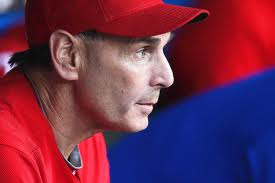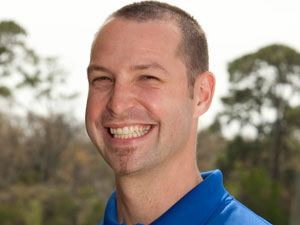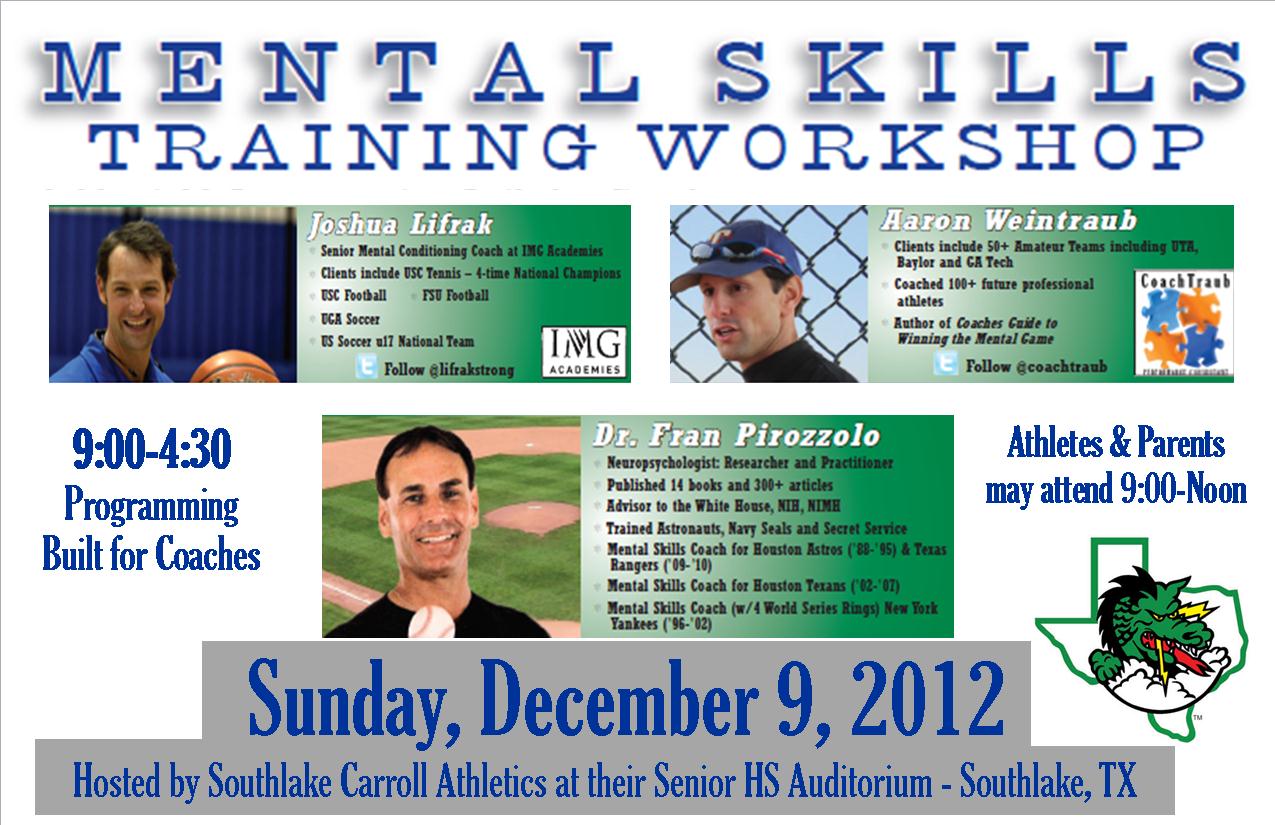DVDs FROM THIS EVENT ARE AVAILABLE. CLICK FOR DETAILS.
This event was designed for collegiate and high school coaches. 9:00-4:30
 Fran Pirozzolo Press Release
Fran Pirozzolo Press Release  Josh Lifrak Press Release
Josh Lifrak Press Release
Get more registration information here.
7 CEU's for attending for Texas Educators.
Attending coaches will receive a free Coaches Manual for Mental Skills Training
complete with both coaches' and athletes' awareness exercises, leadership worksheets, and other valuable resources.
NFCA_2015_Pre-Convention_Workshop_with_Coach_Traub.pdf
1501 W. Southlake Blvd., Southlake, TX
Discounts for group registration.
Schedule Details:
9:00 Introduction by Master of Ceremonies Jeff Dicus. Coach Dicus is the head football coach at Duncanville High School.
9:10 Aaron Weintraub: Leadership Training for Today's Student-Athlete
9:45 Q&A followed by a break
10:00 Fran Pirozzolo: Neuroscience Lessons for the Development of Talent
10:45 Q&A followed by a break
11:00 Joshua Lifrak: Purpose Wins: Thoughts Create Actions and Actions Create Results
Noon-1:00 Lunch Break
Afternoon for coaches only:
1:00 Josh Lifrak: Concentration: How to Help Athletes Focus
1:40 Dr. Fran Pirozzolo: Understanding How the Human Brain Learns, Remembers, Forgets, and Stores Knowledge and Skills
2:10 Discussion Initiation - M.C. Jeff Dicus
2:20 Break
2:30 Discussion and Case Studies
2:50 Aaron Weintraub: Mental Skills Training Toolbox: Confidently Teaching Imagery, Cues, Routines, and Confidence
3:15 Discussion
3:25 Coaches' Own Goals Project
3:35 Break
3:45 Josh Lifrak Wrap-Up
3:55 Fran Pirozzolo: Lessons from the Field
4:15 Aaron Weintraub Wrap-Up / Q&A
A Brief Interview with the Speakers
We all know that you don't have to be sick to get better, but why should a coach who already teaches mental toughness well attend this workshop?
JOSHUA LIFRAK: "Change is inevitable, growth is optional. We at IMG work from a growth mindset perspective. You may already be great a teaching mental skills but there is always something you can learn for the people that teach mental skills day in and day out. This is an opportunity to learn new creative mental toughness skill building techniques that are proven to work."
FRAN PIROZZOLO: "Many professions, such as medicine and psychology, have taken it upon themselves to institutionalize the need for "continuing education", requiring that licensed members of their field carry out a specified number of hours of intense training. The reasons for this are important and varied, including the fact that we acquire new scientific information at a mind boggling rate. It would be greatly discouraging to think that our doctors had stopped their press forward in learning about new methods, techniques, and approaches when they left medical school. No one needs to be told that, in my own field of neuroscience, new studies require that we change our approaches and perspectives as a result of new science pushing back the boundaries of knowledge. The result of this fortuitous advancement in science is that I can expect that when I see my doctor tomorrow for my strained shoulder, it is unlikely that he will break open his can of leaches to begin bloodletting."
AARON WEINTRAUB: "Everyone is looking for an edge and I think we all realize there are no shortcuts to success. However, mental skills is a difference maker for performance, especially under pressure situations like the playoffs. Coaches should attend because this workshop is likely to provide an efficient way to get an edge."
You have helped many athletes succeed under pressure in a big way. In your personal relationship with athletes, what is one thing you are able to do to help them perform that other coaches might not be as skilled at doing?
JOSHUA LIFRAK: "Paint the picture. Paint the picture of that athlete functioning on his/her highest level and have them hold onto that image so strongly that it ultimately becomes not an image of who they are but rather simply who they are."
FRAN PIROZZOLO: "As a psychologist, I have a sacred responsibility to a client to be "fully present", to be a skilled listener, and to use my training and experience to enable the client to better understand himself and the conditions associated with "performing under pressure". I am constantly reminded by our experiences in competition that each client is different from every other, which helps us to understand that the principles and strategies that we will employ cannot fail to honor the unique structure of each client's personality, skills, and background."
AARON WEINTRAUB: "Help them understand how powerful they are when they control the controllables. This helps them trust and focus one play or training step at a time."





